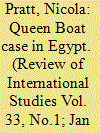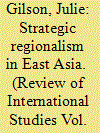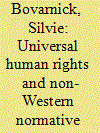| Srl | Item |
| 1 |
ID:
077305


|
|
|
|
|
| Publication |
2007.
|
| Summary/Abstract |
The 'separation fence' 'constructed by Israel to isolate itself from the Palestinians' raises many questions. Why was the construction of a fence perceived by the Israelis as a solution and as the only solution? What determined the specific, serpentine path of the fence and what impact does it have on both Palestinian and Israeli societies? A resulting reconfiguration of the power structure within Palestinian society is clearly unfolding and deserves analysis
|
|
|
|
|
|
|
|
|
|
|
|
|
|
|
|
| 2 |
ID:
077308


|
|
|
|
|
| Publication |
2007.
|
| Summary/Abstract |
assumes that East Asia is evolving into a distinctive regional community. The orthodoxy attributes this development to the growing influence of the diplomatic practices espoused by the Association of Southeast Asian States (ASEAN) and its related institutions. However, a paradox remains, namely: despite the failure of ASEAN's distinctive practice to fulfil its rhetorical promise in Southeast Asia both immediately prior to and in the aftermath of the Asian financial crisis in 1997, it is nevertheless considered sufficient to validate the projection of ASEAN defined norms onto a wider Pacific canvas. This study analyses how an academic preference for constructivism has misinterpreted the growth in official rhetoric extolling East Asian regionalism since 1997 in a way that has helped produce and reinforce this paradox. By contrast, we contend that government declarations of a developing East Asian identity actually serve to obscure the continuation of traditional interstate relations and do not herald any wider, let alone inexorable, movement towards an integrated regional community
|
|
|
|
|
|
|
|
|
|
|
|
|
|
|
|
| 3 |
ID:
077300


|
|
|
|
|
| Publication |
2007.
|
| Summary/Abstract |
The central aims of this article are twofold: first to debate whether or not women's human rights can underpin a universal feminist project; second to defend women's human rights as a useful political tool that can be used to challenge injustice and discrimination against women. The first section of the article briefly sets out the universality/particularity debate in both human rights theory and in feminist theory. This serves as a point of departure for the subsequent discussion of universality and particularity in relation to women's human rights specifically. Section one of the article is entitled 'debating' women's human rights as a universal feminist project, because this is, indeed, a matter of dispute (as evidenced by the contributions to this forum). That women's human rights are universal is contested by some feminists although the reasons for their scepticism are quite different from those advanced by ultra-conservatives and religious fundamentalists
|
|
|
|
|
|
|
|
|
|
|
|
|
|
|
|
| 4 |
ID:
077306


|
|
|
|
|
| Publication |
2007.
|
| Summary/Abstract |
The government's targeting of homosexuality in May 2001, following years of 'turning a blind eye' to Cairo's gay scene, is studied here in terms of the links between the sphere of interpersonal relations and notions of national security within international relations. The persecution of men for alleged same-sex relations not only filled newspaper columns and created a spectacle to divert people's attention away from the government's failings. More importantly, the event represented an opportunity for government officials, the media and other civil society activists - both within Egypt and abroad - to 'perform' a discourse of national security through which national sovereignty was (re)produced and political order was maintained. However, this national security threat was not only posed by the external threat of Western governments, international NGOs and other transnational actors concerned with respect for human rights within Egypt. More importantly, this threat was constructed as originating with those people failing to conform to the 'norm' of heterosexual relationships
|
|
|
|
|
|
|
|
|
|
|
|
|
|
|
|
| 5 |
ID:
077307


|
|
|
|
|
| Publication |
2007.
|
| Summary/Abstract |
The US, China and Japan are often portrayed as three giant states dominating the region of East Asia in perpetual potential conflict. This article proposes that such assessments should be tempered in the light of changing regional and global dynamics and, in particular, in view of the growing centrality of the region of East Asia itself for foreign policy agendas. Adopting a framework underpinned by the concept of strategic regionalism, this article focuses upon the developing collective identification of region, and assesses the possibility for joint leadership in East Asia
|
|
|
|
|
|
|
|
|
|
|
|
|
|
|
|
| 6 |
ID:
077303


|
|
|
| 7 |
ID:
077304


|
|
|
|
|
| Publication |
2007.
|
| Summary/Abstract |
This article examines wartime sexual violence, one of the most recurring wartime human rights abuses. It asserts that our theorisations need further development, particularly in regard to the way that masculinities and the intersections with constructions of ethnicity feature in wartime sexual violence. The article also argues that although women and girls are the predominant victims of sexual violence and men and boys the predominant agents, we must also be able to account for the presence of male victims and female agents. This, however, engenders a problem; much of the women's human rights discourse and existing international mechanisms for addressing wartime sexual violence tend to reify the male-perpetrator/female-victim paradigm. This is a problem which feminist human rights theorists and activists need to address.
|
|
|
|
|
|
|
|
|
|
|
|
|
|
|
|
| 8 |
ID:
077302


|
|
|
| 9 |
ID:
077301


|
|
|
|
|
| Publication |
2007.
|
| Summary/Abstract |
In 2004 the French National Assembly and Senate passed legislation which makes it illegal for Muslim women to wear headscarves (the hijab) within French public schools. To be precise the legislation refers to the banning of ostentatious religious symbols within the secular domain of the public school system, but is clearly aimed primarily at Muslim women, following a long-running dispute over this issue. Similar debates are taking place in other European countries such as Germany, Italy, Belgium, the Netherlands and Spain. A bill modelled on the recent French legislation has been tabled in the Belgian senate, whilst various court cases have been brought in other European countries by Muslim women who have been banned from wearing headscarves by employers or schools. Following a ruling of the German Supreme Court that a Muslim teacher should be allowed to wear a headscarf, as this did not contravene current legislation, the state of Baden-Wuerttenberg acted to introduce legislation to ban headscarves, and this legislation is likely to be copied by six other German states.
|
|
|
|
|
|
|
|
|
|
|
|
|
|
|
|